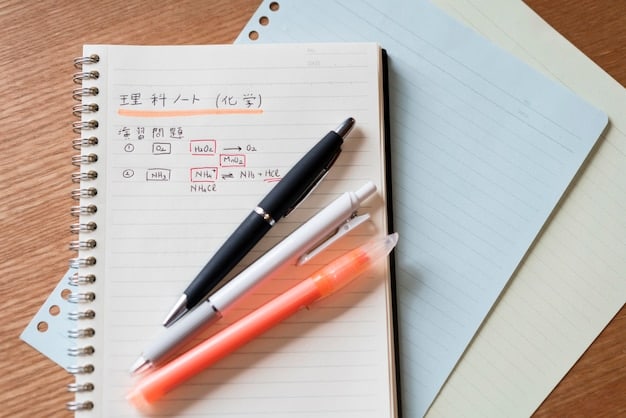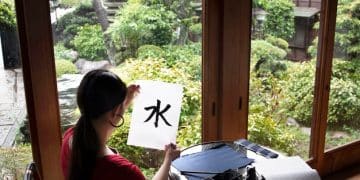Japanese Drama Vocabulary: Learn Key Words & Phrases for Comprehension

Advertisements
Understanding Japanese drama vocabulary is essential for viewers to fully immerse themselves in the nuances of plot, character relationships, and cultural context, enhancing the overall viewing experience.
Want to deepen your understanding of Japanese dramas? Mastering essential vocabulary and phrases can dramatically enhance your viewing experience. Let’s explore the key elements of Japanese drama vocabulary: learning essential words and phrases for better comprehension.
Anúncios
Why Learn Japanese Drama Vocabulary?
Japanese dramas, or “dorama” as they’re often called, offer a window into Japanese culture, society, and everyday life. While subtitles are helpful, understanding the underlying vocabulary allows for a richer, more nuanced appreciation of the stories being told. It’s about catching the subtle jokes, the implied emotions, and the cultural references that might be lost in translation.
Learning specific vocabulary used in these dramas also provides practical language skills. You’ll hear common expressions, slang, and polite forms of speech, all of which are immediately useful in real-life conversations. This is a dynamic and engaging way to improve your overall Japanese proficiency.
Anúncios

Plus, understanding the language lets you move beyond simply reading subtitles. You start to hear the intonation, recognize the nuances in speech, and feel more connected to the characters and their experiences.
In this article, we’ll delve into essential vocabulary lists tailored to common themes and situations in Japanese dramas, providing a solid foundation for your language learning journey.
Ultimately, grasping Japanese drama vocabulary opens a door to a much more immersive and rewarding viewing experience. It’s not just about watching; it’s about understanding and truly connecting.
Essential Greetings and Introductions
Just like in any language, knowing basic greetings and introductions is crucial in Japanese. These phrases are essential for understanding the interactions between characters in dramas and allow you to appreciate the social dynamics at play.
Greetings in Japanese often vary depending on the time of day and the formality of the situation. It’s important to recognize these differences to grasp the nuances of character interactions.
Common Greetings
Here are some of the most frequently used greetings in Japanese dramas:
- `Ohayou gozaimasu` (おはようございます) – Good morning (formal)
- `Konnichiwa` (こんにちは) – Good afternoon / Hello
- `Konbanwa` (こんばんは) – Good evening
- `Oyasumi nasai` (おやすみなさい) – Good night (formal)
- `Genki desu ka` (元気ですか) – How are you?
Self-Introductions
Introductions are a vital part of Japanese culture. Watch how characters introduce themselves in dramas to pick up on the correct level of politeness and respect.
- `Hajimemashite` (はじめまして) – Nice to meet you
- `Watashi wa [name] desu` (私は[名前]です) – I am [name]
- `[Name] to moushimasu` ([名前]と申します) – My name is [name] (humble)
- `Douzo yoroshiku onegaishimasu` (どうぞよろしくお願いします) – Pleased to meet you
By mastering these basic greetings and introduction phrases, you’ll have a strong foundation for understanding character dynamics and social interactions in Japanese dramas. Pay attention to how these phrases are used in different contexts to better assimilate their nuances.
Expressing Emotions and Feelings
Emotions are at the heart of any good drama, and Japanese dramas are no exception. Understanding how characters express their feelings can provide significant insights into their motivations and relationships.
Japanese language is rich with expressions to convey a wide range of emotions, from happiness and sadness to anger and surprise. Being familiar with these phrases can help you connect with the characters on a deeper level.
Common Emotional Expressions
Here are some emotional words and phrases you’ll often encounter:
- `Ureshii` (嬉しい) – Happy
- `Kanashii` (悲しい) – Sad
- `Okoreru` (怒れる) – Angry
- `Osoreiru` (恐れる) – Afraid
- `Tanoshii` (楽しい) – Fun
- `Shinpai` (心配) – Worried
- `Bikkuri` (びっくり) – Surprised
Phrases to Express Feelings
Beyond single words, learning phrases allows you to express more complex emotions. Here are a few you’ll likely hear often:
- `Daijoubu desu ka` (大丈夫ですか) – Are you okay?
- `Gomen nasai` (ごめんなさい) – I’m sorry
- `Arigatou gozaimasu` (ありがとうございます) – Thank you
- `Ganbatte` (頑張って) – Do your best / Good luck
By familiarizing yourself with these essential expressions, you’ll be better equipped to understand the emotional landscape of Japanese dramas. Listen carefully to the intonation and observe the characters’ body language to further deepen your understanding.
Family and Relationships Vocabulary
Family dynamics and interpersonal relationships are recurring themes in Japanese dramas. Understanding the vocabulary related to family members and various types of relationships can help you grasp the storylines and character motivations.
The terms used for family members often vary based on the speaker’s perspective (i.e., speaking about one’s own family versus asking about someone else’s family). This distinction is important to understand to fully grasp the conversations.

Family Member Terms
Here are common terms for family members:
- `Okaa-san` (お母さん) – Mother
- `Otou-san` (お父さん) – Father
- `Onii-san` (お兄さん) – Older brother
- `Onee-san` (お姉さん) – Older sister
- `Imouto` (妹) – Younger sister
- `Otouto` (弟) – Younger brother
- `Obaa-chan` (お祖母ちゃん) – Grandmother
- `Ojii-chan` (お祖父ちゃん) – Grandfather
Relationship Terms
Understanding the terms that describe relationships is just as vital. This helps you follow the plot and understand the connections between characters.
- `Tomodachi` (友達) – Friend
- `Koibito` (恋人) – Lover / Boyfriend/Girlfriend
- `Fianse` (婚約者) – Fiancé
- `Otto` (夫) – Husband
- `Tsuma` (妻) – Wife
- `Senpai` (先輩) – Senior (at work or school)
- `Kouhai` (後輩) – Junior (at work or school)
Mastering these terms will greatly enhance your ability to understand and appreciate the complexities of family relationships and interpersonal dynamics portrayed in Japanese dramas. Pay attention to how these relationships influence the characters’ decisions and behaviors.
Workplace and Business Jargon
Many Japanese dramas are set in workplace environments, whether it’s an office, a hospital, or a school. Knowing some common workplace and business-related vocabulary can significantly improve your comprehension of these dramas.
Japanese business culture has its own unique set of etiquette and language use. Understanding specific terms and phrases will help you grasp the professional environment depicted in these dramas.
Workplace Terms
Below are some common workplace terms and phrases you’ll likely encounter:
- `Kaisha` (会社) – Company
- `Buchou` (部長) – Department Manager
- `Kachou` (課長) – Section Chief
- `Shain` (社員) – Employee
- `Arubaito` (アルバイト) – Part-time job
- `Shigoto` (仕事) – Work
Business Phrases
Here are a few common phrases used in business settings:
- `Otsukaresama desu` (お疲れ様です) – Thank you for your hard work
- `Yoroshiku onegaishimasu` (よろしくお願いします) – Please treat me well/I look forward to working with you
- `Keikaku` (計画) – Plan
- `Gyoumu` (業務) – Business/Task
Understanding these terms and phrases allows you to delve beyond the plot of workplace dramas and understand the complex relationships and societal expectations within the Japanese professional world. Pay attention to the context in which these phrases are used to fully grasp their meaning.
Slang and Casual Expressions
Beyond formal vocabulary, Japanese slang and casual expressions add color and authenticity to character interactions in dramas. These informal phrases reflect everyday conversations and help create a more genuine connection with the viewers.
Slang and casual expressions evolve rapidly, and their appropriate use depends heavily on context and relationship. Understanding these nuances is crucial for fully grasping the intentions and feelings of characters portrayed in dramas.
Common Slang Terms
Here are some common slang terms you might encounter:
- `Maji` (マジ) – Seriously? / Really?
- `Urusai` (うるさい) – Shut up! / Noisy
- `Kimoi` (キモい) – Gross/Creepy
- `Yabai` (やばい) – Awesome/Terrible (depending on context)
Common Casual Expressions
Below are some casual expressions often used in everyday conversation:
- `Sou da ne` (そうだね) – That’s right/I agree
- `Honto` (ほんと) – Really?
- `Iiyo` (いいよ) – It’s okay/Sure
- `Dame` (だめ) – No good/Can’t
Incorporating these slang and casual expressions into your understanding of Japanese drama vocabulary makes your viewing experience richer and more realistic. Be mindful of the context and the characters who use these terms to fully appreciate their impact.
Essential Phrases for Specific Drama Genres
Different genres of Japanese dramas often have their own unique set of vocabulary and phrases. Recognizing these specific terms can greatly enhance your understanding of particular drama types, whether they be romantic comedies, medical dramas, or historical period pieces.
Certain vocabulary and phrases become common within specific genres due to the nature of the storylines and settings. Knowing these terms can provide greater insights and prevent misunderstandings within the context of the drama.
Love and Romance Dramas
Here are some key phrases common in romance dramas:
- `Suki desu` (好きです) – I like you
- `Aishiteru` (愛してる) – I love you
- `Issho ni itai` (一緒にいたい) – I want to be with you
- `Mamoru` (守る) – To protect
Medical Dramas
Here are essential terms from medical dramas:
- `Kanjya` (患者) – Patient
- `Byouin` (病院) – Hospital
- `Shujui` (手術) – Surgery
- `Yakuhin` (薬品) – Medicine
Historical Dramas (Jidaigeki)
Key terms specific to historical dramas include:
- `Samurai` (侍) – Samurai
- `Shogun` (将軍) – Shogun
- `Ronin` (浪人) – Masterless Samurai
- `Bushi` (武士) – Warrior
By focusing on the specific vocabulary associated with different genres, you’ll be able to enhance your understanding and appreciation of the various types of Japanese dramas. Familiarizing yourself with these terms will deepen your viewing experience and allow you to connect more meaningfully with the stories.
| Key Concept | Brief Description |
|---|---|
| 👋 Greetings | Learn essential greetings like ‘Konnichiwa’ (Hello) to start understanding character interactions. |
| 💖 Emotions | Know how to express and recognize feelings, like ‘Ureshii’ (Happy) or ‘Kanashii’ (Sad). |
| 👨👩👧👦 Family | Understand family terms such as ‘Okaa-san’ (Mother) and ‘Onii-san’ (Older brother) to follow family dynamics. |
| 🏢 Workplace | Learn common work-related terms like ‘Kaisha’ (Company) and ‘Shigoto’ (Work) for dramas set in professional environments. |
Frequently Asked Questions (FAQ)
▼
Understanding Japanese drama vocabulary allows for a deeper appreciation of the plot, character nuances, and cultural references, enhancing the overall viewing experience. Subtitles often miss subtle meanings.
▼
Start with basic greetings, emotional expressions, and family terms. Create flashcards, take notes while watching, and practice using the phrases in conversations to reinforce your learning.
▼
Common mistakes include relying too heavily on subtitles without actively listening, not understanding the context of slang terms, and failing to practice speaking the phrases to improve pronunciation and fluency.
▼
Yes, Japanese has distinct formal and informal language registers. Formal language is used in professional settings or with elders, while informal language is used among friends and family. Pay attention to the context.
▼
Watch without subtitles occasionally to challenge yourself. Focus on recognizing familiar words and phrases, and try to infer the meaning from the context. Rewatch scenes as needed for clarity.
Conclusion
In summary, understanding Japanese drama vocabulary is a valuable investment for anyone looking to deepen their appreciation of Japanese culture and language. By focusing on essential greetings, emotional expressions, family terms, workplace jargon, slang, and genre-specific phrases, you can significantly enhance your comprehension and enjoyment of Japanese dramas.





